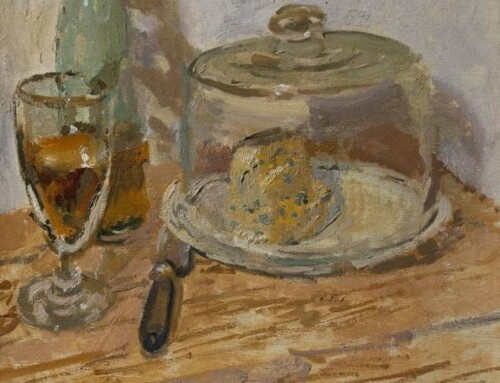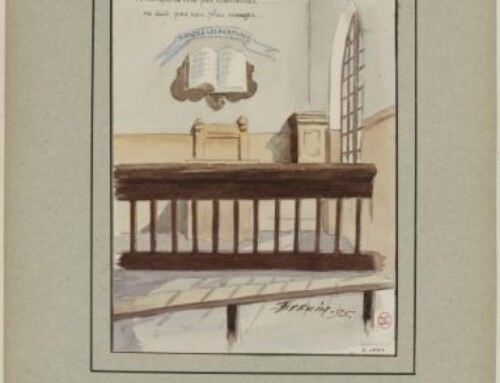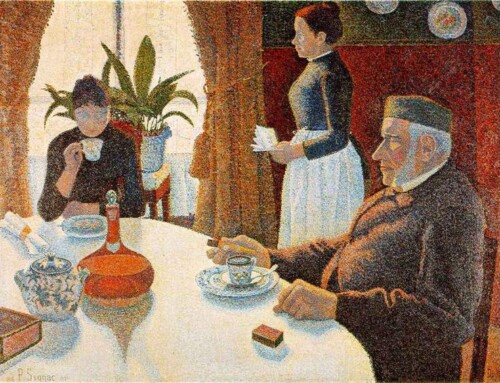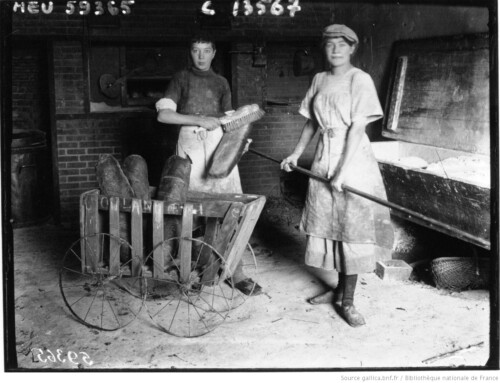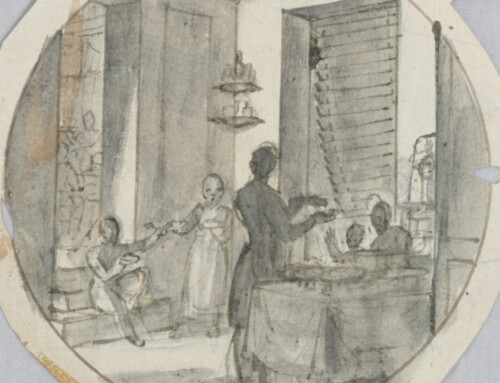How to win an election: have a proven track record of work related to the position being sought, be eloquent about wanting to help your potential constituents, have integrity, hold townhall meetings, …or offer food and drink to voters. This last strategy created some turmoil during a June 1861 election that was held to fill a seat in the conseil général of Marcenat, France. The candidates were Hippolyte André Ponthion Baraduc, formerly a physician in Paris, and Antoine Commolet, formerly an attorney in Murat. Baraduc won by forty-eight votes, but the election results were annulled by July 12th. There were accusations of money given, lent, promised in return for votes. Campaign workers were accused of voter intimidation, and the candidates were accused of intimidating campaign workers. Both candidates were also accused of picking up the tab at cafés and cabarets to coerce or reward voters. A trial was held in which forty-eight witnesses were heard from on the first day and thirty-eight witnesses on the second. Acknowledging that food and drink had been used to sway voters appeared in the testimony of more than twenty witnesses. Was this 1861 election an isolated case? A look at other localities from that time period suggests otherwise.
| Year | Locality | Position sought | Candidate(s) accused of using food and drink to sway voters | Election results |
| 1861 | Marcenat (Cantal, Auvergne-Rhône-Alpes) | membre du conseil général | Hippolyte André Ponthion Baraduc ; Antoine Commolet | annulled |
| 1863 | Martrin (Aveyron, Occitanie) | député au Corps législatif | Pierre Paul Ferdinand Hercule Calvet-Rogniat | validated |
| 1874 | Saint-Julien-Chapteuil (Haute-Loire) | membre du conseil général | Léon Mauras | annulled, then validated |
| 1877 | 2e circonscription de l’arrondissement de Nice (Alpes-Maritimes) | député | François Alphonse Camille Eugene Roissard de Bellet (baron) | validated |
| 1898 | Civray (Vienne, Nouvelle-Aquitaine) | conseiller général | Maurice Pain | validated |
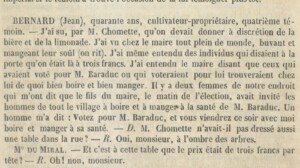
Election de 1861. Page 205. La Tribune judiciaire. Recueil des plaidoyers et des réquisitoires les plus remarquables des tribunaux français et étrangers. Par J. Sabbatier, sténographe du Corps législatif. Tome 1er, 2e série. 1862-3. → https://gallica.bnf.fr/ark:/12148/bpt6k6507222v/f215.item
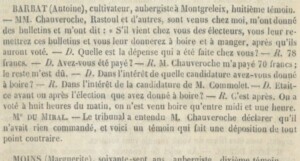
Election de 1861. Page 207. La Tribune judiciaire. Recueil des plaidoyers et des réquisitoires les plus remarquables des tribunaux français et étrangers. Par J. Sabbatier, sténographe du Corps législatif. Tome 1er, 2e série. 1862-3. → https://gallica.bnf.fr/ark:/12148/bpt6k6507222v/f217.item
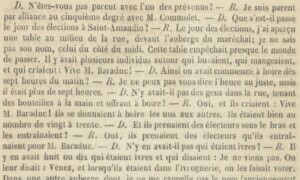
Election de 1861. François Papon, 14ème témoin, page 210. La Tribune judiciaire. Recueil des plaidoyers et des réquisitoires les plus remarquables des tribunaux français et étrangers. Par J. Sabbatier, sténographe du Corps législatif. Tome 1er, 2e série. 1862-3. → https://gallica.bnf.fr/ark:/12148/bpt6k6507222v/f220.item
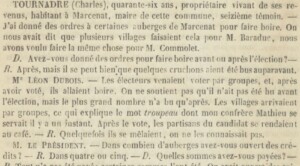
Election de 1861. Page 214. La Tribune judiciaire. Recueil des plaidoyers et des réquisitoires les plus remarquables des tribunaux français et étrangers. Par J. Sabbatier, sténographe du Corps législatif. Tome 1er, 2e série. 1862-3. → https://gallica.bnf.fr/ark:/12148/bpt6k6507222v/f224.item
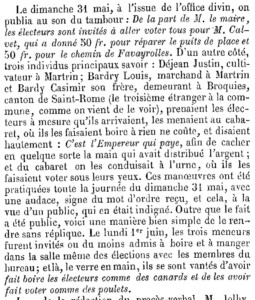
Election de 1863. Page 208. La lutte électorale en 1863, par Jules Ferry. → https://gallica.bnf.fr/ark:/12148/bpt6k24272r/f218.item
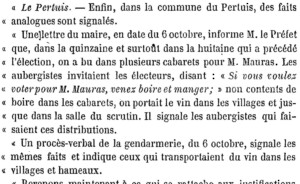
Election de 1874. Page 79. Rapports et délibérations / Conseil général de la Haute-Loire. Deuxième session de 1874. Procès-verbaux des délibérations. → https://gallica.bnf.fr/ark:/12148/bpt6k56864108/f522.item
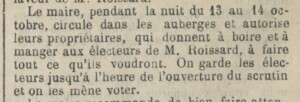
Election de 1877. Page 320. Annales du Sénat et de la Chambre des députés. Chambre des députés, séance du lundi 13 mai 1878. → https://gallica.bnf.fr/ark:/12148/bpt6k6571862h/f18.item
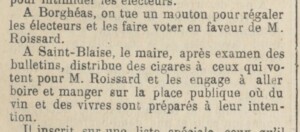
Election de 1877. Page 321. Annales du Sénat et de la Chambre des députés. Chambre des députés, séance du lundi 13 mai 1878. → https://gallica.bnf.fr/ark:/12148/bpt6k6571862h/f19.item
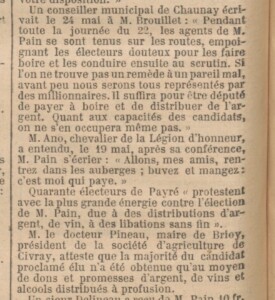
Election de 1898. Page 1877. Journal officiel de la République française. Débats parlementaires. Chambre des députés : compte rendu in-extenso. 1898-06-29. Chambre des députés, 7e législature. Session ordinaire de 1898. Séance du mardi 28 juin. → https://gallica.bnf.fr/ark:/12148/bpt6k6472125w/f2.item
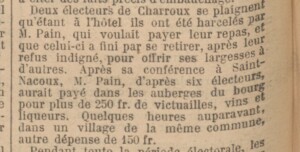
Election de 1898. Page 1877. Journal officiel de la République française. Débats parlementaires. Chambre des députés : compte rendu in-extenso. 1898-06-29. Chambre des députés, 7e législature. Session ordinaire de 1898. Séance du mardi 28 juin. → https://gallica.bnf.fr/ark:/12148/bpt6k6472125w/f2.item
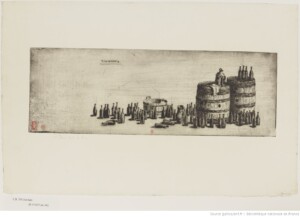
Henri Guérard (1846-1897). Mise en bouteilles. 1887. Bibliothèque nationale de France. → https://gallica.bnf.fr/ark:/12148/btv1b10532332x
▀▄▀▄▀▄
References & Suggested Reading
Alloin, Thierry. L’administration départementale de la Haute-Loire : annuaire historique, an VIII-1940. France, Archives départementales de la Haute-Loire, 1996.
Bitard, Adolphe. Dictionnaire de biographie contemporaine française et étrangère : contenant les noms, prénoms, pseudonymes de tous les personnages célèbres du temps présent, l’histoire de leur vie, de leurs actes et de leurs oeuvres, la date de leur naissance et des principaux évènements de leur carrière, etc., augmenté d’un supplément. France, L. Vanier, 1880.
Conseil général de la Haute-Loire. Rapports et délibérations. Le Puy, 1874.
Crook, Malcolm. Elections in the French Revolution: An Apprenticeship in Democracy, 1789-1799. United Kingdom, Cambridge UP, 1996.
– – – . How the French Learned to Vote: A History of Electoral Practice in France. United Kingdom, Oxford UP, to be published in 2021.
Edelstein, Melvin. The French Revolution and the Birth of Electoral Democracy. United Kingdom, Taylor & Francis, 2016.
Ferry, Jules. La lutte électorale en 1863. Paris: E. Dentu, 1863.
France : Sénat (1875-1942) & Chambre des députés (1876-1942). Annales du Sénat et de la Chambre des députés. Paris, 1878.
Jones, Peter M. Politics in the Rural Society: The Southern Massif Central c.1750-1880. United Kingdom, Cambridge UP, 2004.
Journal officiel de la République française. Débats parlementaires. Chambre des députés : compte rendu in-extenso. 29 juin 1898. Paris: Imprimerie des Journaux officiels, 1898.
Lajoie-Mazenc, Roger. L’Aveyron en république(s) : inventaire, repères et acteurs identifies pour la traçabilité de la politique aveyronnaise 1800-2000. France, R. Lajoie-Mazenc, 2000.
Ribier, Louis de. Le Conseil général de Cantal, 1800-1935. Editions U.S.H.A., 1935.
Sabbatier, Jean. La Tribune judiciaire. Recueil des plaidoyers et des réquisitoires les plus remarquables des tribunaux français et étrangers. Par J. Sabbatier, sténographe du Corps législatif. Tome 1er, 2e série. 1862-3. Paris: Borrani et Droz, 1855-1863.
